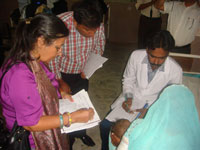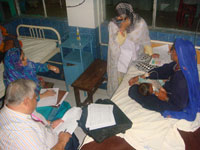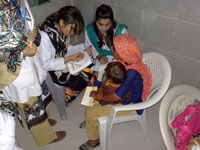 A regional team from WHO evaluated the process and outcomes of the incorporation of the integrated management of newborn and child illness (IMNCI) into the paediatric teaching curriculum at Liaquat University of Medical and Health Sciences, Jamshoro, Sindh province, Pakistan, from 17 to 20 October 2011.
A regional team from WHO evaluated the process and outcomes of the incorporation of the integrated management of newborn and child illness (IMNCI) into the paediatric teaching curriculum at Liaquat University of Medical and Health Sciences, Jamshoro, Sindh province, Pakistan, from 17 to 20 October 2011.
The main objective of the evaluation was to assess whether the introduction of IMNCI in the department's teaching programme in 2010 had led to students’ competence in managing sick children with common health problems according to the IMNCI guidelines and make recommendations to further strengthen the teaching programme.
The evaluation was carried out according to the standard methodology described in the “Guide to the evaluation of IMCI pre-service education”, developed by WHO Regional Office.
After reviewing the information on the paediatric department and IMNCI teaching process and methodology, the team:
- observed several outpatient clinical and theoretical teaching sessions;
- visited the library and teaching sites;
- conducted focus group discussions with students and teachers involved in IMCI in both the paediatrics and community medicine departments;
- assessed student knowledge through a written test of multiple-choice questions and case scenarios;
- assessed student clinical skills through observation of case management practised by students.
- Finally, the team provided feedback to the vice-chancellor and staff of the University, including the dean and heads and teaching staff of the departments concerned.
 Overall, the environment at Liaquat University is very supportive to IMNCI teaching, which has formally endorsed it at high level in the institution. A provincial IMNCI pre-service training committee has also been established to coordinate this initiative in schools in the province, which has been supported by several national and international partners.
Overall, the environment at Liaquat University is very supportive to IMNCI teaching, which has formally endorsed it at high level in the institution. A provincial IMNCI pre-service training committee has also been established to coordinate this initiative in schools in the province, which has been supported by several national and international partners.
All teaching staff at the paediatric department have been trained in IMNCI, with a staff-to-student ratio of 1:13 for both practical and clinical sessions. More than a third (35%) of total teaching hours are allocated to IMNCI.
Teaching of IMNCI is, in general, consistent with traditional, classical paediatric teaching, well integrated throughout the curriculum and materials, interactive and makes use of a variety of teaching methods, with sessions including the full range of theoretical, practical and clinical sessions.
The outpatient department has been set up in a way conducive to teaching IMNCI, with a smooth flow of patients.
IMNCI-related items have been included in student examinations, with 30% of total marks assigned to IMNCI.
 Reference materials are available in the library and regularly used by students.
Reference materials are available in the library and regularly used by students.
Approaches to sustain the initiative in the long term have been adopted and teaching has been enhanced based on review of the experience.
Teaching staff’s and students’ attitudes towards IMNCI are very positive, with students greatly appreciating the variety of teaching methods and clinical sessions.
Overall, students performed well in both the knowledge and clinical assessment tests, showing confidence with the topics and clinical skills: 79% of the students assessed obtained an overall score of at least 80% in the case management skill test, based on to the IMCI standard protocol as a gold standard. The two tests have helped identify teaching areas which may be further enhanced.
This was the fifth such evaluation after those carried out by the Regional WHO team in Egypt and Sudan.








